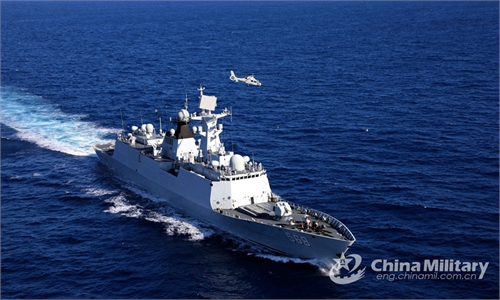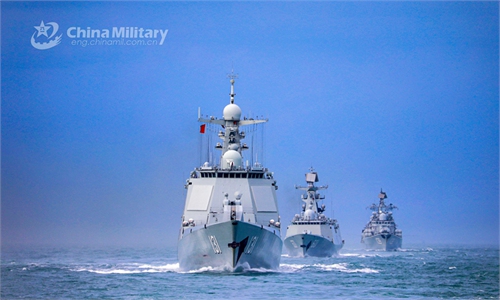China, Russia joint drills conclude with live-fire anti-terrorism operation featuring J-20
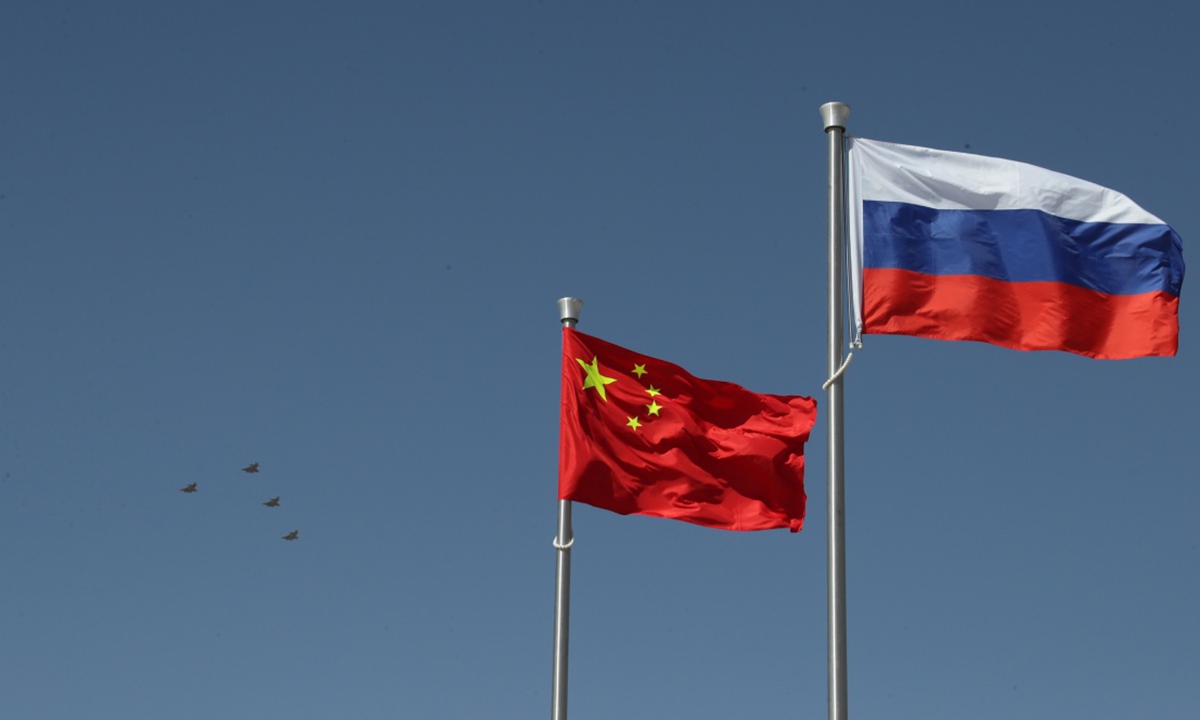
The exercise ZAPAD/INTERACTION-2021 kicks off at a combined arms tactical training base of the PLA Army in Qingtongxia City of West China's Ningxia Hui Autonomous Region on August 9, 2021. Pictures show that the participating troops from China and Russia parade at the launch ceremony in 13 ground phalanxes, together with two air echelons. (eng.chinamil.com.cn/Photo by Liu Fang)
China and Russia on Friday wrapped up the five-day Zapad/Interaction-2021 joint strategic exercises in Northwest China with the live-fire phase featuring some of the most advanced weapons in the world and strong, saturation firepower that analysts said would be overwhelming to any enemy.
The drills displayed not only on a strategic level, but also on tactical and technical levels that China and Russia are no allies but better than allies, and are capable of jointly tackling regional security issues including terrorism as well as global challenges brought up by countries like the US, Chinese experts said.
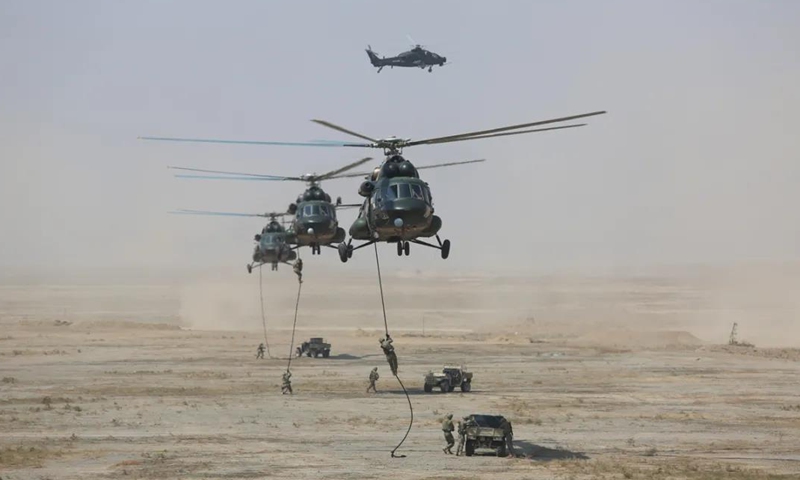
Photo:Ministry of Defense
Kicking off the live-fire drills and mimicking an anti-terrorism operation, four J-20 stealth fighter jets of the Chinese People's Liberation Army (PLA) Air Force spearheaded an air raid on hostile frontline command centers and air defense observation outposts, followed up by another round of attacks by two JH-7 fighter bombers, China Central Television (CCTV) reported on Friday.
Artillery forces on the ground then simultaneously shot volleys that accurately rained down on targets and kept them in their tracks, and that was when attack helicopters and transport helicopters carrying special operations troops closed in at low altitude and joined the multidimensional, multidirectional attack.
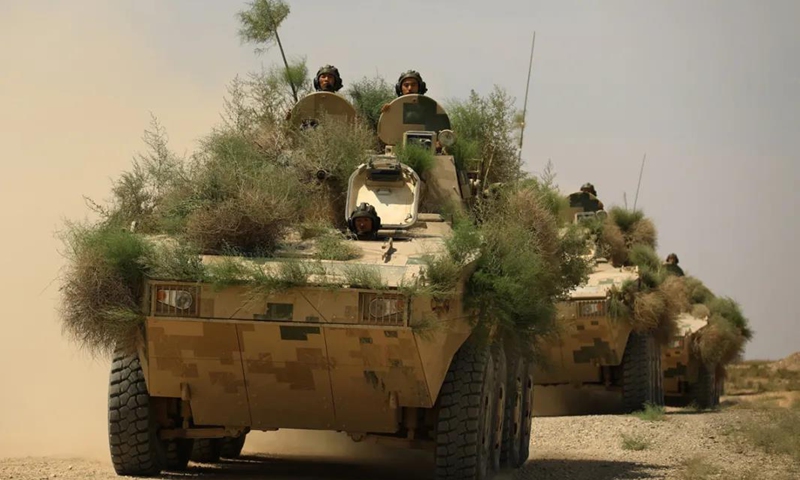
Photo:Ministry of Defense
In an innovative tactic that was used for the first time, fully-loaded Y-20 large transport aircraft airdropped heavy equipment including airborne assault vehicles while also hosting airborne troops parachuting simultaneously from three hatch doors, greatly increasing the effectiveness of airborne combat.
A joint warplane group featuring China's H-6 bombers, J-11 and J-16 fighter jets as well as Russia's Su-30SM fighter jets continued air strikes, while air defense forces used different types of missiles and artillery to accurately intercept hostile drone swarms.
Armored assault vehicle groups consisting of Chinese and Russian troops pushed forward and from different angles, striking down hostile armored vehicles, bunkers and infantry targets with intensive firepower.
Air force aviation forces, army aviation forces, ground armored vehicle and artillery forces and air defense forces acted in an area of six kilometers long and seven kilometers deep, and launched the attack from six different altitudes by taking turns.
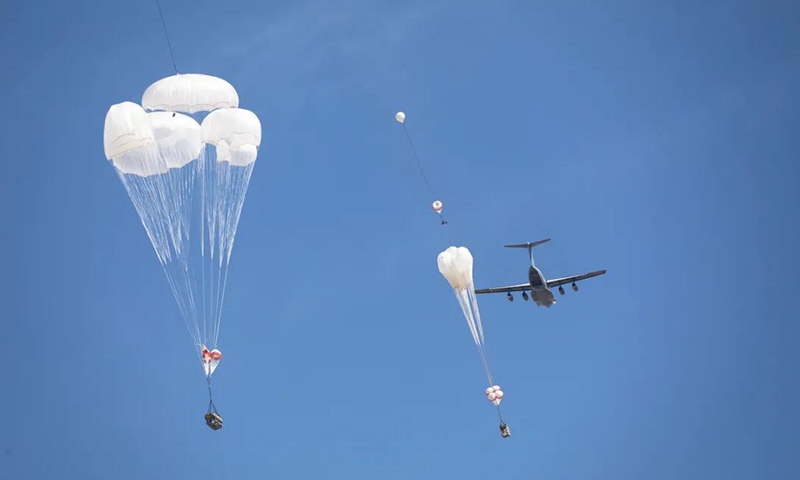
Photo:Ministry of Defense
About 265 tons of munitions were dropped within 45 minutes, 228 rounds of munitions were fired per minute on average, with the peak number being 364 rounds per minute.
About 81.6 percent of weapons and equipment used in the exercises were of new-types, CCTV said.
More than 10,000 personnel participated in the exercise, which is themed jointly safeguarding regional security stability in antiterrorist combat, CCTV reported.
Chinese State Councilor and Defense Minister Wei Fenghe and Russian Defense Minister Sergei Shoigu inspected the live-fire drills, held talks and witnessed the signing of related cooperation documents, the Chinese Defense Ministry announced in a press release on Friday.
One of the highlights of the exercises was the deployment of the J-20s, some of China's most advanced warplanes, observers said, noting that this is the first time China has sent the J-20 in a joint exercise with another country.
The J-20s kicked open the door and seized air superiority by accurately attacking high-value targets on the ground, and this was the leading role the J-20s had played in the exercises as stealth fighter jets, Song Zhongping, a Chinese military expert and TV commentator, told the Global Times.
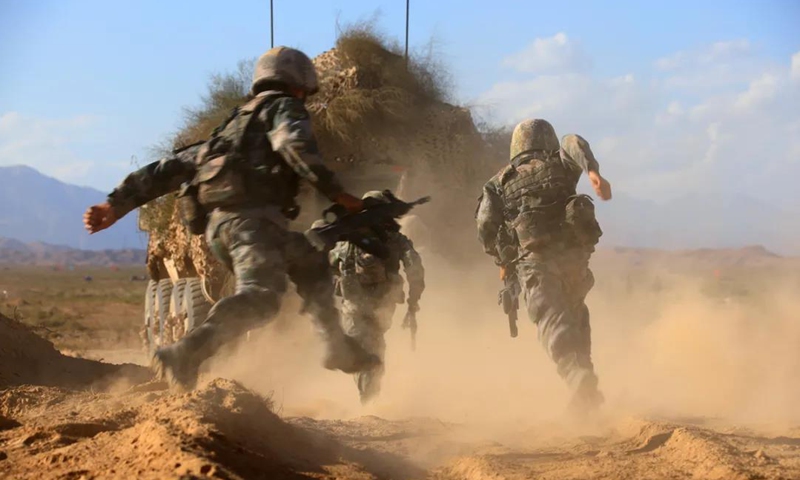
Photo:Ministry of Defense
This allowed ground troops and other non-stealth warplanes to proceed with their missions with much less risks, and the latter's attack was overwhelming and should be considered as a saturation attack, that can defeat any enemy, analysts said.
During the exercise, the Chinese and Russian troops also used a specially designed joint command system for the first time, which interconnected both sides' combat systems, enabled teleconference and allowed the transfer of combat documents. This greatly boosted systematic combat efficiency, CCTV reported.
Previous media releases from both sides showed that China for the first time provided the Russian troops with the PLA's main battle equipment, including wheeled assault guns and armored assault vehicles.
Many details like these in the exercises show that China and Russia are not allies, but better than allies, not only on a strategic level, but also on tactical and technical levels, experts said.
That Russian troops used Chinese weapons and formed joint groups with the PLA troops in the drills is the highest level of military cooperation between countries except a military alliance, Ye Hailin, deputy director-general at the National Institute of International Strategy of the Chinese Academy of Social Sciences, told the Global Times.
This is sufficient proof of the values of the strategic coordination between China and Russia, who are not allies, but their relations weigh more than allies, Ye said, noting that since China and Russia are not allies, they won't ask the other to abide by any binding obligations or coerce the other to serve their own strategic objectives. But their relations go beyond an alliance and their cooperation level exceeds that of many allies.
At a time when the situation in Afghanistan is at a critical juncture following the US troop withdrawal from Afghanistan, the China-Russia joint exercise serves as a powerful deterrent to the restless international terror groups and showcases the responsibility of the two major military powers, Ye said.
Senior Colonel Li Shuyin, an expert at the PLA Academy of Military Sciences who observed the exercises on site, told the Global Times that some countries, particularly the US, have been attempting to suppress China and Russia.
Some speculated that the China-Russia joint exercises were also aimed at countering the US.
If such speculations come from the US, they must be trying to shift the blame from themselves to China and Russia; if they come from third parties, this means people understand that it is the US that threatens global military security, Li said.
So many wars the US has waged over the past years did not safeguard regional security and stability, and the US instead became the biggest destroyer of it, Li said, taking the US' troop withdrawal from Afghanistan as an example.

